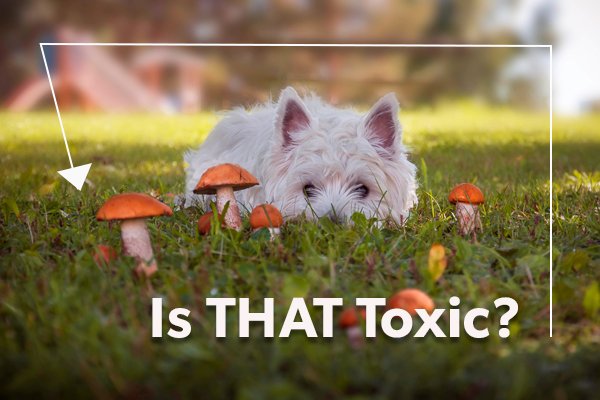17 Hidden Yard Hazards You May Be Accidentally Exposing Your Dog To
Now that spring is here, we’re spending more time outdoors enjoying our yards and blooming plants and so are our dogs! While your yard can be a wonderful and relaxing place to spend time with your dog, you should always be aware of some of the common items found in your yard that can cause serious harm to your dog.
- Azaleas and Rhododendrons – These plants contain a chemical called grayanotoxins that can affect a dog’s skeletal and cardiac muscle. All parts of these plants are considered poisonous and ingesting as little as 0.2% of an animal’s body weight can result in poisoning.
- Cocoa Mulch – Cocoa mulch is made from shells of the cocoa plant and smells like chocolate in hot weather. Dogs are attracted to the smell and may ingest it. Like chocolate, this mulch is toxic to dogs.
- Mushrooms – A wide variety of mushrooms can appear in our lawns, especially during rainy seasons. Some are non-toxic, however others can cause serious gastric issues for your dog. As a rule, remove mushrooms when they appear in your lawn and don’t allow your dog to eat them.
- Tomatoes – A substance in tomato stems and leaves, called Solanine, is harmful to dogs in large quantities.
- Rhubarb Leaves – Rhubarb makes the ASPCA list of plants toxic to dogs, and the consequences described are not to be taken lightly. If you catch your dog downing rhubarb leaves, head immediately for a veterinarian. Symptoms include salivation, tremors and kidney failure.
- Lilies – The peace lily, calla lily, amaryllis, lily of the valley, autumn crocus and the common houseplant, giant Dracaena or palm lily, are all deemed dangerous to dogs by the ASPCA. Ingestion of lilies can cause gastrointestinal upset, depression, anorexia and tremors.
- Grapes (and raisins) – Ingesting even a small quantity of grapes can result in anorexia, vomiting, diarrhea, and potentially severe acute renal failure.
- Other Common Garden Plants – Visit the ASPCA List of Toxic Plants for Dogs for a full list of plants to avoid.
- Foods That Can Be Poisonous to Pets – Visit the Humane Society of North America list of Foods Can be Poisonous to Pets.
In addition to potentially dangerous plants, you should also keep your dog away from these other common lawn and garden poisons.
- Fertilizer, Blood Meal – These items contain large amounts of nitrogen. When ingested, they can cause vomiting, diarrhea and pancreatitis. Keep these items away from your dog.
- Compost – Compost piles contain decaying plants and food and may also contain tremorgenic mycotoxins, which are toxic to your dog. Fence around compost piles to keep animals out of this material. When spreading compost in your garden, beware of your dog entering your garden and ingesting this material.
- Salt Water – Although usually not in your back yards, many families take their dogs to the beach on summer vacation. Dogs and owners are not aware that salt water is dangerous and allowing our dogs to drink it may result in severe hypernatremia, or salt poisoning. Be Safe. Don’t let your dog drink salt water.
- Blue-Green Algae – This algae can appear on lakes or waterfronts where algae can accumulate, especially in hot summer months. Allowing dogs to swim in or drink water containing blue-green algae or cyanobateria can cause vomiting, diarrhea, lethargy, weakness, shock, icterus, tremors, lethargy, seizures and respiratory distress and potentially death within 24 hours to several days.
- Slug and Snail Bait – Slugs are common in many gardens in Maryland during the summer months and many gardeners may treat this condition using slug or snail pellets. A common ingredient in this type of bait is metaldehyde, which is toxic to all species, especially dogs.
- Rodenticides, Mole and Gopher Bait – If your dog likes to dig, they may uncover forgotten rodenticides in your yard. These agents containing strychnine and zinc phosphide are the most deadly.
- Herbicides – Treating plants with herbicides according to package directions is especially important when you have pets. As a rule, dogs should be kept away from plants and any plant treated with herbicides. Bottles of herbicides should be stored or disposed of safely and kept away from all pets.
- Sticks – Thinking about playing fetch with your dog and a stick? Smaller sticks can pose a choking hazard for dogs. Does your dog like to chew on wooden sticks? Wood splinters and wood shards can get stuck in your dog’s mouth, causing infection, or swallowed, possibly causing a choking or digestive problems, such as intestinal blockage.
Sources: PetPoisonHelpLine.com, ASPCA, AKC, Humane Society of North America, CNN, and Reader’s Digest.

